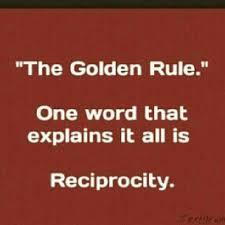The Law of Reciprocity in Relationships

The reciprocity principle is one of the basic laws of social psychology: It says that “in many social situations we pay back what we received from others.” You smile at me, I smile back.
In relationships it “involves a mutual exchange of support, emotional investment, and love.” Reciprocity in a relationship is characterized by each partner feeling able to share their needs. A willingness to meet the needs of the other person. People have a deep subconscious need to reciprocate for anything that is done to or for them.
"These relationships often have an expectation of months or years for repayment because they are among the most intimate," says Dr Kelly Campbell. "The only type of relationship that might have more relaxed rules for exchange would be family. The types of resources exchanged within these relationships are not necessarily parallel. For example, one partner might provide emotional support while the other provides financial stability. In general, though, both partners require love, so it is expected that this resource is regularly exchanged and is not one-sided." For reciprocity to work in a relationship you must be engaged.

"Within relationships, it is important that reciprocity is balanced," Campbell adds. "If one person is doing all of the giving and the other is doing all of the receiving, then the relationship is lopsided and at risk for dissatisfaction, infidelity or dissolution." In order to build a healthy relationship, it's always good to know where you stand in the realm of reciprocity and where you need to improve.

Campbell notes that satisfaction and commitment build in a relationship that has balanced reciprocity. In most cases, it comes down to open communication, clear expectations, and mutual respect. "The healthiest relationships are ones in which both partners are fulfilling each other's needs on a regular basis," she says.
The Law of Reciprocity is one of the most powerful of all determinants of human behavior. This is because nobody likes to feel that he or she is obligated to someone else. When someone does something nice for us, we want to repay that person, to reciprocate. We want to be even. Because of this, we seek an opportunity to do something nice in return. This law is the basis of the law of contract, as well as the glue that holds most human relationships together. Relationships thrive when each person gives of themselves to the other.

Healthy emotional reciprocity is a critical factor in any committed relationship—romantic or otherwise—because it is a key indicator of love and support. In a relationship with healthy reciprocity, each individual feels they give and receive energy; this feeling of mutual exchange strengthens the relationship overall. On the flip side, a lack of reciprocity can create an unhealthy relationship where one partner experiences burnout or feels used or unloved. Basically, “why would I give you what you want when I’m not getting what I want?” Owning your part is an act of humility, and that gesture opens the door for your partner to reciprocate, to meet you in an honest place."
https://www.youtube.com/watch?v=-sC9VoLyqpw
Try these tips to foster a healthy reciprocal relationship: (Written by MasterClass, May, 2022
Encourage open communication. Healthy communication is the bedrock of any relationship, whether romantic or platonic. It’s also a great way to ensure your connection remains reciprocal. Practice active listening and confirm each person in the relationship feels happy with the give-and-take of energy and support.
Remember to take. Sometimes you need support, too. Avoid a nonreciprocal situation by taking in addition to giving. Healthy interdependence is important in a relationship.
Tailor reciprocity to each individual. Relationship therapists talk about reciprocity in terms of different love languages. If you like to receive gifts and your partner or partners like to receive words of affirmation, make sure you tailor your support to their love language rather than your own.
Think long-term rather than judging a single moment. In any situation, there will be someone who’s giving energy and someone who’s receiving energy. Avoid focusing on these specific moments to judge if there’s an imbalance in your intimate relationship. Instead, zoom out and think about the bigger picture. Consider trends over longer periods and decide if each person in the relationship supports their partner or partners’ well-being.
“I AM” Marriage”

My marriage is composed of two unique individuals. I help make it what it is. It will be loving, if I am. It will be respectful, if I am. It will be friendly, if I am. It will be honest, if I am. We will have intimacy, if I am intimate. We will be kind, if I am. I will receive forgiveness, if I am forgiving. It will be generous, if I am a generous giver. It will be a committed relationship, if I am committed. Communication will be effective, if I am communicating effectively. To feel joy in our marriage, I am grateful. It will be a marriage of loyalty and love, compassion and mercy, patience and forgiving if I, who make it what it is, am filled with these same things.


